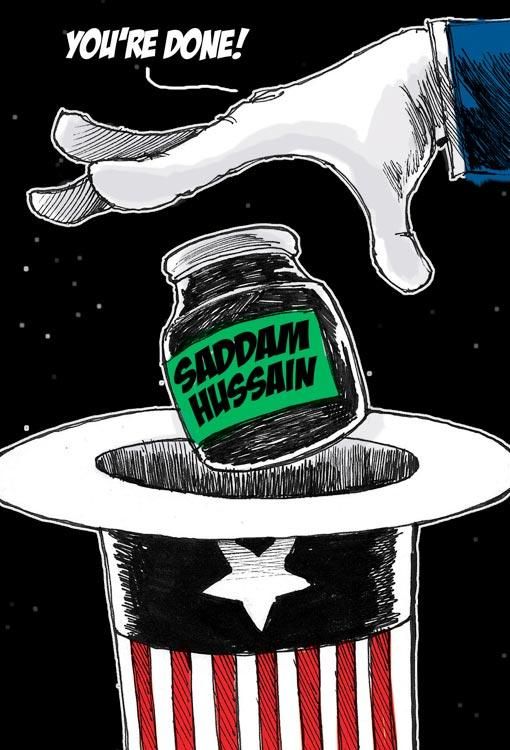Kuwait celebrated the 17th anniversary of its liberation from Iraqi occupation by the US-led coalition forces on February 26.
Kuwait was liberated by 750,000 coalition troops from more than 30 countries, the world's biggest military alliance since the Second World War.
The liberation war of Kuwait has changed the outlook and the need for the United States in Gulf countries. This was a result of the late Iraqi president Saddam Hussain's miscalculations.
On this occasion, we recall memories of Saddam and the Baath Party's 30-year dictatorship, which left Iraq with a legacy of wars, massacres and mass graves. Saddam's legacy is not confined to Iraq and its people, but extends to Kuwait, Iran, Lebanon and Mauritania.
His actions led to the establishment of the US presence in the Gulf region. This, as a result of his occupation of Kuwait and the military imbalance among the regional powers.
History will mark Saddam's occupation of Kuwait as the start of the strong and prolonged US presence in the region. By occupying Kuwait, Saddam had legalised the US presence in the region and even the need for it to protect people and regimes.
Saddam was executed while Iraq is under US occupation. This came about a year before Iraqi's Presidency Council endorsed the execution of Ali Hassan Al Majid for genocide against Kurds.
Al Majid, known to the world as "Chemical Ali", was appointed as the "Ruler" of Kuwait, considered by Saddam to be the 19th province of Iraq.
In fact, Chemical Ali deserves this just punishment for torturing Kuwaitis and their courageous national resistance against the occupation. Kuwait had been the brotherly Arab country that supported and stood by Iraq during its difficult times.
The question arises: Had Saddam and his associates known that the occupation of Kuwait would mark the beginning of their end, would they still have invaded the country?
Similar fate
Saddam gave the Americans a pretext to stay in our region. Due to him, the GCC people, ruling systems and trading establishments require the US presence to protect them from a similar fate, and avert the consequences of the war in Iraq.
With the American elections just a few months away, there is a fear that if Democrats - either Barack Obama or Hillary Clinton - win the White House, they may withdraw US troops.
The US administration is being asked not to withdraw its troops from Iraq, for many reasons.
The GCC countries have genuine fears about Iran's nuclear programme and its growing power. As a result, they want the US to retain its military presence.
This is simply because they need to maintain a balance with Iran, which has taken strategic advantage of the vacuum left after the fall of both the Taliban in Afghanistan and Saddam in Iraq.
In order to achieve its ambitious targets, Iran spares no time or effort to benefit from the situation in Iraq.
The visit by President Mahmoud Ahmadinejad under the protection of the US occupation is evidence of Iran's success in turning Iraq from an enemy into a friend, which will support and empower Iran and make its project a success.
There is no doubt that the Iranian influence is growing, and Iran is satisfied with this. Moreover, this has also been acknowledged by the Americans, when they called Iran for negotiations on the Iraqi issue.
Meanwhile, the Arabs are absent from the Iraqi scene, and have so far failed to play any role in this key Arab country.
With more than 200,000 troops stationed from Muscat to Mosul, the US has gained more influence over the countries in the region, both individually and collectively.
Security cooperation
Washington is further cementing its relations with the GCC countries to develop bilateral partnerships with each country, and security cooperation with the six GCC nations as one bloc.
In October 2007, Washington began the third round of talks on the Gulf Security Dialogue with the GCC countries. The aim was to strengthen the security of the countries in the region, including Iraq.
Dealing with the terrorist threats - both of a conventional and unconventional nature - and wars was also among other issues covered during the US-GCC talks.
It is amazing what a devastating impact one man's decisions, whether of Saddam in autocratic Iraq or George W. Bush in democratic US, can have on the prosperity, security and future of an entire nation and a strategic region that will pay the price of these mistakes for many decades to come.
Dr Abdullah Al Shayji is a Kuwaiti writer.











